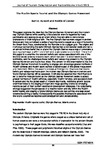The Muslim Sports Tourist and the Olympic Games Movement
| dc.contributor.author | Russell, K. A. | |
| dc.contributor.author | O'Connor, N. | |
| dc.date.accessioned | 2018-06-21T12:36:41Z | |
| dc.date.accessioned | 2018-06-22T11:44:47Z | |
| dc.date.available | 2018-06-21T12:36:41Z | |
| dc.date.available | 2018-06-22T11:44:47Z | |
| dc.date.issued | 2013 | |
| dc.identifier.citation |
Russell, K. A. and O'Connor, N. (2013) 'The Muslim Sports Tourist and the Olympic Games Movement', Journal of Tourism Consumption and Practice, 5(2), p.30-42 | en_US |
| dc.identifier.issn | 1757-031X | |
| dc.identifier.uri | http://hdl.handle.net/10026.1/11718 | |
| dc.description.abstract |
This paper explores the view that the Olympic Games Movement and the modern day Olympic Games while seeking to be a secular event is regarded by many participants and spectators as an event where they are able to demonstrate expressions of their religious faith. The first Olympic Games were staged in ancient Greece and they comprised a series of sporting events staged as a way of honouring the Greek God; Zeus, considered by the Romans to be a pagan god. The origins and mythology surrounding the early Olympic Games had a non-secular basis and led to an almost intrinsic belief that to attend the Olympic Games was a way of undertake a sporting pilgrimage to affirm one’s faith and to give praise to one’s God. The aim of this paper is to examine the relevant beliefs and values associated with one of the World’s fastest growing religions Islam, which has over 1.5 billion worshippers worldwide, and the challenges these beliefs and values may present to the Olympic Games Movement and future host cities. The context for this examination is that the Olympic Games Movement is seeking to engage and encourage greater numbers of Muslim athletes and Muslim sport tourists to become part of this global mega event and movement. Within this paper’s conceptual findings the influences that Islamic beliefs and values may have upon the modern day Olympic Games movement and future Olympic Games will be assessed. It will also be asserted that this influence is set to become more profound as the Olympic Games Movement seeks to attract greater numbers of Muslim athletes, especially Muslim females, and spectators both in person and via the global reach of modern day media. Additional growth factors examined relate to the staging of major and mega sporting events by emerging nations as part of their tourism destination development strategies. It is today being strongly suggested that prospects of a wealthy nation and city within the Muslim world hosting and staging a future Olympic Game are fast coming one step closer towards becoming a reality. Consequently the possible implications associated with this future occurrence requires acknowledgement and understanding. | en_US |
| dc.language.iso | en | en_US |
| dc.publisher | University of Plymouth | |
| dc.rights | Attribution-NonCommercial-NoDerivs 3.0 United States | * |
| dc.rights.uri | http://creativecommons.org/licenses/by-nc-nd/3.0/us/ | * |
| dc.subject | Muslim sports tourist | en_US |
| dc.subject | Olympic Games | en_US |
| dc.subject | Islamic events | en_US |
| dc.title | The Muslim Sports Tourist and the Olympic Games Movement | en_US |
| dc.type | Article | |
| plymouth.issue | 2 | |
| plymouth.volume | 5 | |
| plymouth.journal | Journal of Tourism Consumption and Practice |



